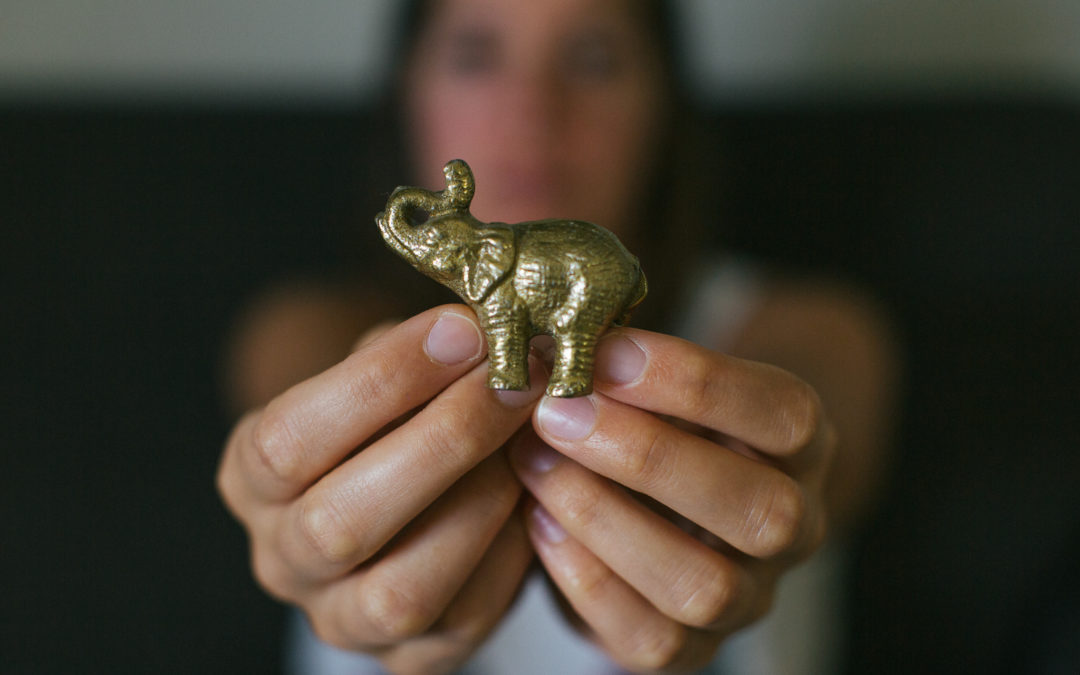It’s time to talk about the elephant in the room. Well, this elephant is everywhere, not just in one room. It’s in all of the circles- schools, the church, in the mom groups, tagging along at the playdates. It sits on the sidelines of the soccer games, in between the chairs in the office, and gets pushed to the corner of our homes. Or in the closet where everything is tossed when guests come. That elephant is mental health.
MORE THAN JUST A HASHTAG
The whole subject of mental health has gotten a bad rep over the years. “That kind” of conversation is off-limits. Bring up something like anxiety or depression at a dinner party and you don’t get treated like something’s wrong, you get treated like something’s wrong with you.
Talking about mental health is either too personal, too private, or too uncomfortable. We’re told to pull a Dory and just keeping swimming, just keep swimming, just keep swimming, swimming, swimming. Well, Dory needed someone to talk to. We all do. The feeling of shame can be stifling.
It’s time to welcome the conversation about mental health on a regular basis, not just save it for one day a year and throwing #mentalhealthday under a post.
When I share my journey with mental health, or that I’m currently managing anxiety, particularly with those who haven’t experienced it for themselves, I might get one of two reactions: A good ole’ fashion dismissal wrapped up in a “Just look at the bright side” or “it could be worse” kind-of-phrase. That or a flat-out shut-down- “We don’t talk about that kind of thing”.
But I’m TIRED OF IT. We should be able to speak openly about a counseling session just like we would share if we went to a doctor. Mental health IS health. It’s a part of every.single.person.and.every.single.life. Just because it isn’t always seen, doesn’t mean we can’t acknowledge it.
DOES ANY OF THIS APPLY TO ME?
You might be thinking, “I’ve never dealt with anxiety, depression, or any of that so how does this apply to me?”
Good for you. Seriously, I’m envious! But let me tell you something, mental health is not just about struggles, disorders, negativity, or what some might think of as “the bad stuff”. From the day we’re born until the day we pass from this earth, mental health affects all of our emotional, psychological, and social well-being. It affects how we think, how we feel, and how we act. Our mental health contributes to how we manage things like stress, making choices, and being able to relate with others and build connections. So yeah, it’s kind of a BIG DEAL.
We need to re-frame the way we think about and approach mental health. We need to recognize the important role it plays in everyone’s life, not just in the lives of those currently struggling. This is a part of life that doesn’t need to be ignored or dismissed and deserves a greater level of attention, just like the status of our physical health gets. Mental health is health. We might even have to pay closer attention to it because it’s not something that can always be seen. The symptoms of poor or damaged mental health aren’t always obvious. I can’t tell you how many people I have met that look completely healthy on the outside but are wasting away and a mess on the inside.
If you are a human being, you are impacted by your mental health, and therefore have a right to join in the conversation. Your head-space, as I like to call it, might look different from others. That’s the beauty of diversity. We are all wired differently. There’s no qualifying point of poor mental health that earns you a right to this discussion. You don’t have to suffer from debilitating anxiety or panic attacks to recognize the importance of considering your own mental health and talking about it or prioritizing it more.
There are two circles in which I have noticed a severe lack of mental health awareness and conversation- in church and in motherhood.
THE ELEPHANT IN CHURCH/CHRISTIANITY
People shouldn’t be made to feel any less Christian or like they don’t pray enough because they deal with something like anxiety. I can’t think of a better way of loving people well than by providing them space to share their hearts without fear of judgment or condemnation.
If churches prioritized mental health and filling empty cups as much as they did filling seats, and opened the platform to discuss on a deeper level, we’d see more lives changed and more people willing to participate in the Church as a whole.
Let’s say it louder for those in the back- Talking about your mental health and dealing with problems doesn’t make you a bad Christian. You can love Jesus and be a process, too. Too often, Christians feel shame for having anxiety. They’re made to feel like they’re less than- less Christian, less than others, less serious about their faith, less spiritual. Being the person in the church with “bad mental health” makes you feel like Dumbo the elephant sitting among the masses.
If the church focused more on making people feel less like the problem and focused more on the actual problems they’re dealing with, more people would get saved. I’m not talking about soul-salvation either. I’m talking about literally saving lives from battles with debilitating mental health. It was not God’s intention for us to suffer. Dumbo needs to be invited into the church.
You can still love Jesus and struggle. Having anxiety or managing your mental health doesn’t make you less Christian. It makes you more human.
*I am not a Bible scholar but I want to mention one quick thought. Don’t throw rocks at me.* While Jesus lived a perfect life, He was also human. This means that He must have felt feelings, had emotions and needed to manage mental health. I can’t help but think about the times through scriptures when He retreated to spend time with the Father. I can only imagine He prayed, quieted Himself, and got away from all the noise of the crowds, questions, healing, even His closest disciples. He needed time to himself, too. He needed space and time to reflect. He experienced mortal pain and took them straight to His Father who met Him with complete loving kindness. This is how churches should approach mental health.
In the meantime, I’ll keep raising my hands in surrender- both in worship to my Jesus and also to my sisters, who are probably anxious as hell to step foot in a busy church. I’ll wave my arms high enough for them to see me all the way in the back. I’ll stand on the elephant’s back so they can see me, too.
THE ELEPHANT IN MOTHERHOOD
I don’t know anyone that needs more space to talk than a mama. Not because it’s a “female thing”, but because motherhood is HARD, yo. It’s is a full-body experience of wiping, patting, changing, leaking, and repeating.
Moms need to be extra aware of their mental health. But instead of being encouraged to share more openly about how they’re really doing, society slaps a “made-for-this” sticker on them and expects them to have their shit together all the time. Sure, a woman CAN be a mother (in so many different ways), but that doesn’t mean the mama and her needs have to be pushed to the back of the pantry. It’s difficult enough to do mom-life; we don’t need to make it harder.
Our culture worships moms that can do and be all of the things. Before she knows it, mama’s running on E and loses herself. Her mental health suffers and the domino effect ensues… identity> relationships with others> physical health, etc. They’re all affected by the quality of her head-space and heart-space. Mama can’t pour from an empty cup. Because her mental health is always set on the back burner, she feels lost. Life wasn’t gifted to us to be lived by scraping by and surviving from only scraps of ourselves and stale Cheerios. But when your mental health isn’t in that great of shape, that’s what it feels like.
Just like a baby, the mother will thrive in love and care. What better way to love a mama than by opening up a conversation and saying, “I accept you as you are”. We were not made to carry the unbearable weight of shame. Poor mental health tried to steal my motherhood experience away from me (I share more about that here).
It’s time to talk about more than teething and the weather at playdates. It’s time to discuss the commonality that threads us together on just as deep of a level as doing mom-life together. That’s our mental health and well being.
While not every play date or get-together is conducive to conversation (because kids and diaper changes and tantrums), there will never be a time and a place if you don’t make the time and place. Don’t forget that, Mama friends. Let’s start inviting Dumbo to the playdates.
A SIMPLE INVITATION
The moment we’re born we are searching for love and connection. We look for that warm touch and assurance, and sure, maybe a nipple. Specifically, we search to be loved as we are. When we provide others with the chance to talk openly or share their mental health journey, we do just that. We are conduits of love as we provide the space to do it. We need to do this without judgment.
Even Dumbo the elephant needs to be loved. There’s no better way to love others and ourselves than by holding space and having this kind of conversation.
Bringing awareness to mental health doesn’t have to be complicated. Don’t make it intimidating or sterile. It doesn’t have to wait until the therapist’s office. Heck, we’d all probably save a lot of money if we just talked with each other without judgment. Your willingness to open up extends an invitation for others to do the same.
You don’t have to walk up to a stranger, slap em’ on the shoulder, and ask, “What’s happening in your brain lately?”. I mean, if that’s your approach, do you boo. We can start inviting mental health into the conversation by asking things like this: “How’s you’re heart doing today? How are you really feeling? How’s your headspace? You have space to share if you’d like to”.
Our willingness to share our stories is an invitation for others to do the same. Let’s talk about the elephant in the room, friend. No pressure, no judgment. If more conversations were like this, maybe I’d go to more playdates.
-Maddie



